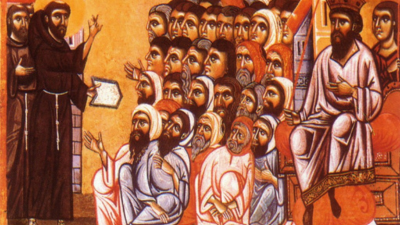The Crusades (Part 3)
St. Francis of Assisi
Did the experience of meeting with the Sultan of Egypt, Al-Malik al-Kamil, change the saint’s life? We know the experience forever committed the Friars to the Holy Land.

It is important to recognize why Francis came to Damietta during the Fifth Crusade is just one part of his life. How the experience of the crusade and his meeting with the Sultan of Egypt, Al-Malik al-Kamil, may have changed Francis is a different part of the saint’s life. While the early sources about the life of Francis are uniform in Francis’ zeal for evangelization and his desire for martyrdom, many modern scholars dismiss these as hagiographic (“saint making”) embellishments. The modern desire, especially among Franciscan scholars, seems to ensure that Francis “the peacemaker” arrives on the shore of Egypt in 1201. When one looks outside modern Franciscan scholarship, especially to the current medieval specialist, one gains a different perspective. André Vauchez, a French medievalist noted for his recent and thorough book on Francis, thinks that “some commentators are doubtful today [re: martyrdom], fearing to attribute to their hero a suicidal attitude or irresponsible behavior.” Vauchez goes on to write that “Contrary to what is sometimes affirmed, the search for martyrdom was not in contradiction with his desire to follow Christ, who died on the cross to open to humanity the way to salvation. To face tribulations and dangers, including the loss of life, in order to spread the Christian faith was, from the beginning, a constitutive element of Franciscan sensibility.”
At a human level, one has to wonder what Francis was thinking. We do not know if he left Italy intending to find a way to meet with Al-Malik al-Kamil, but their meeting is a well-documented historical event. If one is looking for a hagiographic element to the story, this meeting would be it. The poor, wandering saint-to-be crossing battle lines and meeting with the Sultan of Egypt, the leader of the Islamic world. The early Franciscan sources (Thomas of Celano, Bonaventure) write about the encounter – as one might expect. But there are other sources, outside the Franciscan sphere, present at Damietta who testify to Francis’ intention, departure, and return from his meeting. Those sources include: Jacques de Vitry, Bishop of Acre; Ernoul, squire and chronicler of Baliol II of Ibelin; the chroniclers of John of Brienne, king of Jerusalem; as well as several anonymous sources from Frankish crusaders. Finally, we also have the testimony of an Arab author of the fifteenth century, Ibn al-Zayyat, who evokes an epitaph on the tomb of the great mystic Fakhir al-Din, spiritual counselor of al-Kamil, where it was written: “He was a person of virtue known to all. His famous adventure with Malik al-Kamil and what happened to him because of the monk: all this is very famous.”
The crusaders had been engaged in combat/siege for almost a year when Francis and Brother Illuminato arrived at Damietta. Francis certainly never thought about joining the Crusade as a combatant—his status as a religious prohibited him from taking up arms no less than his personal experience and subsequent conversion. What is historically clear is that Francis found the crusaders already enmeshed in a siege of the city – underway since July 1219. What is less than clear is what Francis saw, felt, and did while in Egypt since he never writes about the experience. For that we have the accounts previously mentioned – and they do not all agree beyond that Francis crossed the battle lines, was gone two or three days, met with the Sultan, and returned unharmed with a letter of passage through Muslim lands. The description of the time in the Sultan’s camp falls along these lines:
- Francis was captured by the Sultan’s warriors, beaten, and taken before the Sultan – or Francis was intercepted and escorted to the Sultan or his functionaries since he might have carried a peace proposal from the crusaders.
- Francis defended Christianity in debate with Muslim scholars, soundly defeating them – or, he simply proclaimed the Gospel – or – in another account, Francis challenged the Muslim scholars to a trial by fire, walking over burning coals. When they refused, he offered to walk the trial alone – which the Sultan refused.
- The Sultan tried to offer Francis riches if he would convert – or, as normal hospitality.
- Francis spoke privately to the Sultan to no avail – or, so convincingly, that the Sultan wanted to convert, but knew that would lead to civil war among his people.
It is probably futile to try to know “what really happened” between Francis and the sultan on that day in September 1219. But the simple fact that such an encounter even took place already constitutes in itself a unique event. What seems clear is that whatever discourse occurred inspired in the sultan esteem for the preacher, and an appreciation of his courage if not his beliefs. Perhaps enough so that Francis suggested to the sultan to grant Christians free access to Jerusalem, peacefully and without being subject to financial exactions in their holy places in Palestine. Perhaps this is why the Sultan made such a proposal to the Crusaders a few weeks later: to cede Jerusalem to them in exchange for a quick withdrawal from Egypt.
It is probably this good impression Francis had left with the Muslims which explains why the Friars were, in 1333, the first—and for a long time the only—Latin religious authorized by the sultan to return to Jerusalem, and entrusted, with watching over certain Christian Holy Places, a trust they still maintain today.